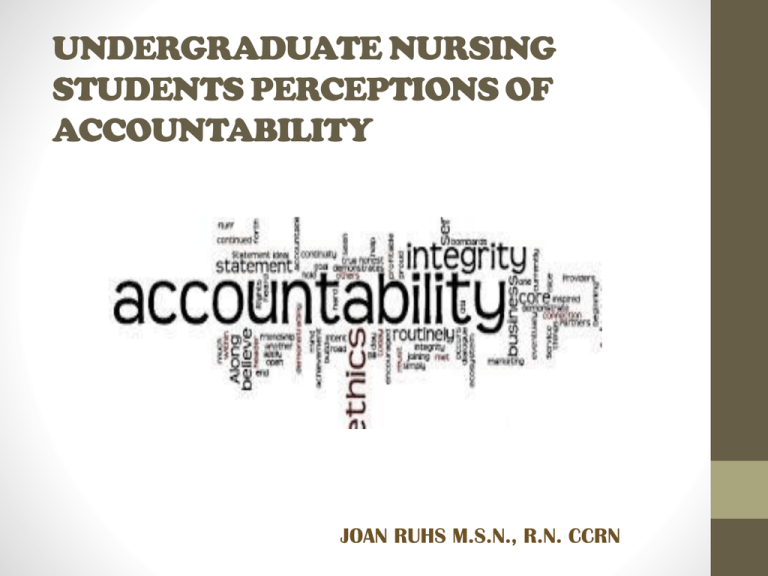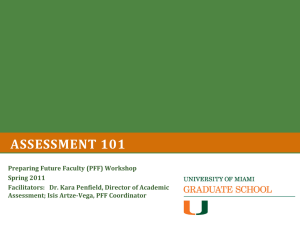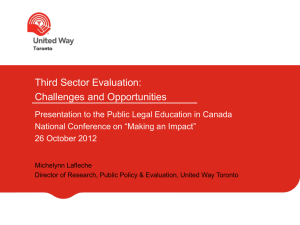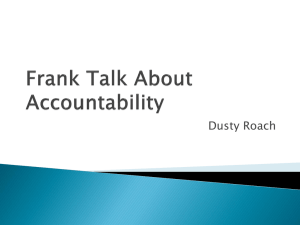undergraduate nursing students perceptions of accountability
advertisement

UNDERGRADUATE NURSING STUDENTS PERCEPTIONS OF ACCOUNTABILITY JOAN RUHS M.S.N., R.N. CCRN Welcome Statement of Problem • Despite the fact that nursing remains America’s most trusted profession, there is a disconnect between public perception and reality. • Nursing education stresses accountability and responsibility • There has been no research dedicated to undergraduate nursing students’ perceptions of accountability. • The absence of supporting literature • Students may find concept of accountability confusing • Accept other’s definitions Background of Study • Nursing-Most trusted profession in United States • Nursing Practice has set specific Standards that the ANA indicates “Define the profession’s accountability to the public and the outcomes for which registered nurses are responsible” (Cartwright-Vanzant, 2011, p.15) • Academia- accountability is the responsibility of faculty and student-Espeland & Shanta (2001) shielding students from accountability inhibits opportunities for growth and development • Accountability indicates students have taken responsibility for their learning Significance of Problem • Primary goal of nursing education is to prepare nurses that are safe and accountable • Luhanga et al. (2009) indicate issues such as lying, not admitting mistakes, and hiding errors as indicators of unsafe practice • Langone (2007) correlation between unethical practices as a student with future professional behavior • “In a survey of nursing faculty, 86% believed participation in academic dishonesty reflects future professional behavior” Bailey (as cited in Langone, 2007, p. 45) Significance of Study • Accountability for one’s actions is a competency that reflects professional awareness and should be promoted in nursing students (Bowers-Lanier & Beecroft, 2008) • Defining perceptions of accountability in undergraduate nursing students will create a portal for learning opportunities that fosters development of positive self-esteem and critical thinking abilities Setting and Population • Baccalaureate undergraduate nursing program in west-central Illinois • Sophomore, Junior, and Senior Undergraduate Nursing Students • Nine females and three males • 5 sophomores, 6 juniors, 1 senior • 11 Caucasian and 1 other • Age range (6) between 18-25 years and (6) between 26-35 years of age • 5 participants obtaining their second degree-7 participants were 1st degree students attending a four year institution in westcentral Illinois Tools and Data Collection • Interview guide containing open-ended questions to obtain rich detailed information about the phenomenon under study • Individual Interviews • Semi Structured • Follow Interview Guide Sample Questions • Please tell me how you define accountability? • Please share what you believe are characteristics or components of accountability. Think about what you believe are necessary characteristics or components of accountability in relation to being a prudent nursing student or registered nurse. • Share your thoughts regarding excessive tardiness or arriving late to clinical or work. • Tell me how family members, peers, and classmates influence behavior related to accountability. Coding • Five pre-established coding categories derived from extensive literature review • Perceptions of accountability defined by responsibility to self and others • Perceptions of accountability defined as an essential component to nursing practice • Perceptions of accountability defined as legal or moral obligation • Perceptions of accountability defined as a value or priority in an individual’s life • Behavior manifested in the workplace/classroom essential to promoting a culture of excellence Discussion-Category 1 Communication with others is vital to accountability Responsibility to self and others is an essential component to accountability Communication with faculty, if unable to keep an appointment or there is lack of understanding regarding course material Communication with classmates if working on group projects Responsibility for a variety of situations including being prepared, meeting needs of others, and having a sense of self, as an essential component to the nursing profession “Make sure your communication “I define accountability in terms of responsibility that you place on yourself with regards to not only your behavior but in how you keep yourself or hold yourself accountable for getting things done.” is open with them and that teammates know how you are feeling because we can’t read minds, first of all, and maybe in their minds they are doing enough.” “Having those crucial conversations saying, look you know tell me what is going on with you.” “Put forth your best effort and the responsibility that if something didn’t go as you planned that you take ownership of that.” DISCUSSION CATEGORY 2 • Communicate Respectfully and Professionally • Proper communication should occur when posing a question or speaking with nurses, physicians or family members • Communicate away from the patient • “If you see any nurse doing something you can just kindly remind them. I personally would not want to say anything to her because I feel it would be rude and disrespectful.” • “I wouldn’t want to scare the patient. I would make sure it was handled professionally and respectfully.” • “I would communicate with the nurse directly about their lack of correct or formal protocol.” DISCUSSION CATEGORY 2 • Not following proper procedure may demonstrate lack of accountability • Behaviors exhibited by professionals that may be considered a breach of policies enacted by healthcare facilities • “The nurse is not being accountable for her actions, because, I mean she was probably saving time but it is not proper procedure and she knows that. Sometimes we need a reminder that the small things do matter.” “Laziness” • Not following protocol may pose risk to self and others • Behaviors that may cause harm to the nurse as well as other patients • “The nurse was negligent.” • “She’s putting the patient at risk for an infection and I would say, well I mean she is setting a bad example for the student.” DISCUSSION CATEGORY 2 • Unprofessional Behaviors as a Student may Continue as a Registered Nurse • Indicates whether participants feel positive behavioral change is possible • Mixture of responses • “If you’re not accountable as a student then you’re not going to be a good R.N. which makes total sense.” • “If you are still continuously displaying those characteristics it is going to be really hard to change those bad habits. I don’t think they would be the best nurse on the floor. I probably wouldn’t want to work with that person.” DISCUSSION CATEGORY 3 • Honesty is an essential component of accountability • Truth and ethical behavior • Doing the Right Thing • Conscientious behavior • “Honesty, like if I did that it would just eat away at me forever and I feel like they have no sense of conscience.” • “I feel it’s that person’s responsibility, it’s a moral thing. I would feel terrible because it’s on your conscience.” • “Be as honest with my patients as I can.” DISCUSSION CATEGORY 3 • Accountability as a Student Includes Reporting Dishonest Behavior of Staff as Well as Classmates • May be difficult • Would feel comfortable using anonymous approach • Not reporting dishonest behavior is unacceptable • “ I would have to anonymously contact the teacher/instructor and I’d have to tell them about it cause I couldn’t live with that.” • “I just can’t keep this a secret because this could affect me too.” DISCUSSION CATEGORY 3 • Plagiarizing is Dishonest and Unlawful • Drastic increase in academic dishonesty • Moral integrity of students that plagiarize is often questioned • Difficulty detecting plagiarism as well as imparting consequences • “They are stealing.” • “They totally stole it.” They plagiarized. It’s huge and not ok. It’s wrong on so many levels. You’re stealing.” • “I think it is wrong. It scares me. It kind of makes my heart palpitate just you saying that.” • “If you cheated then you should be, you’re held accountable. You’re not supposed to cheat. You signed a waiver saying that you wouldn’t cheat.. DISCUSSION CAETGORY 4 • Family has a great influence over behaviors • Stresses the importance of family members in developing values and beliefs • Parents, grandparents, and close friends • Timeliness • “My mom and dad have made me accountable throughout my whole life.” • “Grandpa, he was the one who taught me, if you’re not 15 minutes early, you’re late.” • “One of my biggest pet peeves is arriving late for stuff. I think arriving late is rude. Growing up, my dad always enforced if you are not five minutes early you are late.” DISCUSSION CATEGORY 4 • Generational Differences affect Level of Accountability • Behavioral characteristics specific to that generation may impact levels of accountability • Instant Gratification • Value Socializing with friends • “I feel like our generation is kind of falling off into a downhill slope and I don’t like it.” • “People are becoming lazy, spoiled and instant gratification.” • “Everybody is just out for themselves.” • “How people talk to each other, the words they use, saying please and thank you. I see a generation that is scary.” • “The younger students are living for the weekends. The generations definitely have different attitudes towards responsibility.” DISCUSSION CATEGORY 4 • Peer influence has a strong influence on behavior • Can be positive and negative • May attempt to alter behaviors • “If their peers are modeling behavior they will absolutely identify with that and mimic that.” • “I think the greatest pull is their friends and their peers.” • “Sometimes just telling your friends to go away is the best way to do it.” • My friends get kind of irritated, but at the same time I have to do what is best for me and not what is best for them.” DISCUSSION CATEGORY 5 • Setting Examples and Displaying Accountability • Actions taken by faculty and nurse leaders that foster accountable behaviors in students and staff • Timeliness, setting good examples, displaying the same behavioral standards that are expected of students/staff • “When your teachers are late and the whole time they’re always preaching you need to be on time and get your stuff in.” • “Teachers putting off good vibes that influences everything we do.” • “I think that an instructor shows up on time themselves or even a bit early then that will influence the students to do the same.” • “When someone is publicly recognized for doing something well, it typically motivates others because people like to be recognized for doing something whatever that may be.” DISCUSSION CATEGORY 5 • Consistency in Expectations • Frustration with consistency in clinical instructor expectations • Some participants felt that a higher level of expectation was intimidating but made them feel prepared and ready to care for the patient • “There’s a lot of inconsistency. It seems as though one clinical instructor will require something that another won’t.” • “I just wish there was a little more consistency. Because you could go with one clinical instructor and fail and then pass with another.” DISCUSSION CATEGORY 5 • Specific Practices to Accountability • Strategies used by faculty that promotes professional behavior • Skits in the classroom • Have a specific module about accountability and the benefits of how it affects people • Faculty meetings with students that are repeatedly tardy • Open door policies • Checking Clinical Prep • Hardwiring students to be accountable • Tardiness policies SCENARIO QUESTIONS As a student nurse, you observe a registered nurse perform a dressing change without using gloves or following sterile procedure. The nurse removed the soiled dressing without gloves, and placed a new dressing over the wound without proper cleansing. Think about accountability and share your thoughts about the behavior in this scenario. How do you believe you would respond to the actions of the registered nurse? What characteristics or components of accountability may be missing or compromised? SCENARIO ONE DISCUSSION • Scenario One • Participants felt like R.N. displayed lack of responsibility and accountability to self and patient • Student accountability for reporting incident • Majority would speak with nurse or report her actions • “It might have been laziness or she forgot the main priority was the patient.” • “I think a lot of times on the floor, as a student nurse, you see something that is not right. It is kind of hard to ask that nurse, why are you doing this?” • “I would communicate directly about their lack of correct or formal protocol.” SCENARIO QUESTIONS You are working on a group project with classmates. One student repeatedly does not follow-thru on his/her work load. The other group members repeatedly do this student’s work and are becoming frustrated at the lack of contribution from their classmate. Please share your thoughts about this situation. Tell me what characteristics or components of accountability may be missing in this group. Share what steps, if any, you believe could be taken by the group that might increase accountability among the students. SCENARIO TWO DISCUSSION • Scenario Two • Participants express frustration in group work • Usually core group of students doing majority of work • Participants felt punctuality, caring attitude, responsibility, respect for group members, communication, and consistency missing from students not doing their share of work • Communicating with others imperative • Faculty involvement • “I would just rather do it all.” • “They push it off. It’ll get done. Somebody will do it. They’re lazy.” • “I would talk with the person who is not pulling their end with the project.” SCENARIO QUESTIONS You have been told in secrecy that a group of classmates have plagiarized a research paper off an internet site. The paper is worth 200 points and could mean the difference between passing and failing the course. . Tell me your thoughts about this situation? Tell me what characteristics or components of accountability might be missing in this situation. Share what steps, if any, you would take in this situation. SCENARIO THREE DISCUSSION • Scenario Three • Honesty • “What nurses stand for is honesty and it is just all wrong.” • Characteristics Missing-respect, lack of motivation, responsibility • “Passing it off as your own and expecting the teacher not to notice.” • Communication• “I would just have to tell somebody because I would be scared. Doesn’t that make you an accomplice?” • Academic honesty• “At Blessing-Rieman we have an academic honesty policy and I would feel obligated to the bare minimum to confront the students.” A CULTURE OF ACCOUNTABILITY • RESPONSIBILITY AND ACCOUNTABILITY TWO DIFFERENT CONCEPTS • RESPONSIBILITY-WHAT IS REQUIRED OF YOU • ACCOUNTABILITY-HAVING TO ANSWER FOR YOUR ACTION • THREE ELEMENTS OF ACCOUNTABILITY • CLARITY • COMMITMENT • CONSEQUENCES CLARITY • EXPECTATIONS AND GOALS ARE CLEAR AND SPECIFIC • PAPER IS DUE THRUSDAY AT 2359 VS PAPER IS DUE SOMETIME THIS WEEK COMMITMENT • ACCOUNTABLE STUDENT LISTENS AND AGREES TO MEETING OBJECTIVES OF THE COURSE CONSEQUENCES • ASSIGN APPROPRIATE CONSEQUENCES • IN ORDER TO ASSIGN APPROPRIATE CONSEQUENCES-KNOW STUDENT GRADE LEVEL AND COURSE OBJECTIVES • FACULTY ACCOUNTABILITY • ACCOUNTABLE FOR MEETING RESPONSIBILITIES • CONVERSATIONS WITH STUDENTS CHAIN OF ACCOUNTABILITY • TRUST-WITHOUT TRUST THERE IS BLAME • REQUIRES HONEST DIALOGUE • COMMUNICATION • DIRECTION • WHERE ARE THEY GOING AND WHY • PROVIDE OUTCOME CRITERIA • ENGAGE STUDENT • SUPPORT • CULTURAL ALIGNMENT-EXPECTATIONS • CONSISTENCY REFERENCES Bowers-Lanier, R., & Beecroft, K. (2008). Encouraging professional awareness and activism. In Penn, B. (Ed.), Mastering the teaching role: a guide for educators (pp. 423-433).Philadelphia: F.A. Davis Company. Cartwright-Vanzant, R. (2011). Standards of care. Journal of Legal Nurse Consulting, 22(1), 14-19. Espeland, K., & Shanta, L. (2001). Empowering versus enabling in academia. Journal of Nursing Education, 40(8), 342-346. Estrella, C. (2013). Being called to account. Nursing Standard, 28(13), 66-67. REFERENCES Killam, L., Montgomery, P., Luhanga, F., Adamic, P., & Carter, L. (2010). Views on unsafe nursing students in clinical learning. International Journal of Nursing Education Scholarship, 7(1), 1-17. Langone, M. (2007). Promoting integrity among nursing students. Journal of Nursing Education, 46(1), 45-47. Luhanga, F., Myrick, F., & Yonge, O. (2009). The preceptorship experience: An examination of ethical and accountability issues. Journal of Professional Nursing, 26(5), 264-271. Martin, P., Yarbrough, S., & Alfred, D. (2003). Professional values held by baccalaureate and associate degree nursing students. Journal of Nursing Scholarship, 35(3), 291-296. REFERENCES Rachel, M. (2012). Accountability: A concept worth revisiting. Retrieved from http://www.americannursetoday.com/article.aspx?i d=8874&fid=8812 Taylor, H. (2008). Traditional nursing students. In Penn, B. (Ed.), Mastering the teaching role: A guide for educators (pp. 19-32). Philadelphia: F.A. Davis Company.









